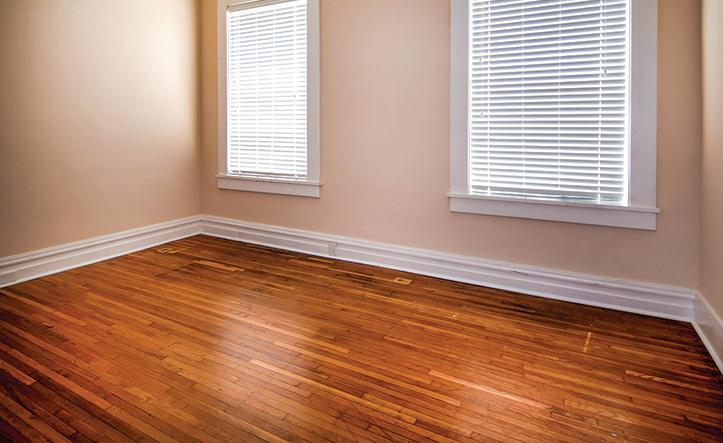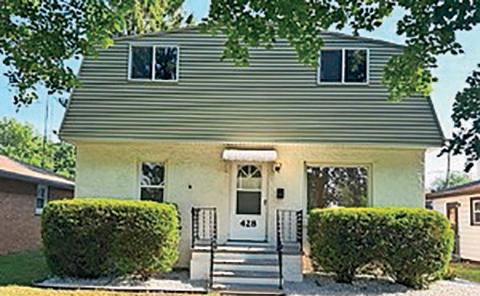





















































Flooding is the most common and costly natural disaster in the United States. Even a few inches of water can cause devastating damage. A licensed insurance agent can advise you on purchasing the right flood insurance to protect your assets. Here’s what you need to know:
that you must pay out of pocket.
What are my options for purchasing flood insurance? Depending on where you live, you have two options:
Buying a home is an exciting milestone and major investment for you and your family. You can keep your investment safe by being mindful that real estate transactions are sometimes targeted by scammers attempting to perpetrate wire fraud. Annual losses from wire fraud amounted to $446.1 million in 2022, according to the most recent statistics available from the FBI’s Internet Crime Complaint Center (IC3). The best way to reduce your risk is to work with professionals, including a REALTOR®, a member of the National Association of REALTORS®.
What is wire fraud?
Wire fraud is a scam using electronic communications to divert money to the bank accounts of cybercriminals.
How does real estate wire fraud work?
The real estate market constantly shifts, and knowing whether conditions favor buyers or sellers can help you make smarter, more confident decisions. Here’s how to recognize which type of market you’re in and what each means for you: What is a buyer’s market? A buyer’s market is when there are more homes for sale than there are people looking to purchase a home. With a greater selection of homes on the market and less competition, buyers typically have more time to shop, negotiate better terms, and may even see price reductions or other purchase incentives. What is a seller’s market? In a seller’s market, there are fewer homes available than there are buyers looking to purchase a home, creating a competitive environment where bidding wars and quick sales can be common. While sellers can often secure higher prices and more favorable contract terms, preparing the home properly and setting a strategic asking price at the outset are still key to attracting strong offers and ensuring a smooth closing.
Does my homeowners insurance cover flood damage? Most homeowners insurance policies do not cover flood damage. While federal disaster assistance may be available to you when a flood occurs, it may be limited and is not guaranteed. The best way to ensure your assets are protected is to purchase flood insurance.
led by a licensed or certified residential appraiser—an independent third party engaged by the lender to provide a professional judgment on the home’s value. Appraisers do not represent the buyer or seller; their sole duty is to come up with a fair and accurate valuation of the property. While all appraisers follow a set of standards, appraisers who are REALTORS® have the added commitment to uphold the REALTOR® Code of Ethics.

Cybercriminals target the participants in a real estate transaction, including buyers, sellers, real estate attorneys, title companies, and real estate brokers and agents. These scammers hack into email accounts, monitor the progress of the transaction, and wait for just the right moment when the transfer of funds is necessary for the closing. Then, they send the buyer an email with a change in payment type (from check to wire transfer) or a change from one bank account to the cybercriminal’s account. These sophisticated fraudulent emails mimic the real person’s identity using company logos and email addresses that are very close but off by a letter or number. Why are scammers targeting real estate transactions?
Understanding homeowners insurance is essential for anyone looking to purchase a home. Start looking at policies early and ask an agent who is a REALTOR® to connect you with a licensed insurance agent for assistance. A detailed industry overview of available coverage is here, and below are some of the basics: What is homeowners insurance?
How can you tell which market you’re in? The market type you are in is usually reflected through the pace of sales, how many homes are available, and how close the sale price of a home was to its listing price. In hot markets, homes may sell within days, often well above their asking price. In slower markets, listings stay active longer and require more negotiation. An agent who is a REALTOR® can advise you on these trends in your specific market and help you interpret how they affect your goals. What should buyers do in a seller’s market? Buyers facing heavy competition should come prepared with a mortgage pre-approval letter, move quickly when a good listing appears, and make strong offers. Waiving contingencies or offering flexible closing terms can also help strengthen your offer. Especially in fast-moving markets, setting a firm budget and walkaway point beforehand helps to ensure you don’t overextend yourself when the process gets competitive. When selecting a buyer’s agent to help you, be sure to ask these ten questions to ensure you are working with the agent who is the best fit for your needs.
• The National Flood Insurance Program (“NFIP”): The NFIP, managed by FEMA, offers flood insurance to property owners, renters, and businesses in participating communities. In return for access to flood insurance, participating communities agree to adopt and implement local floodplain management regulations that help protect lives and properties from flooding. For residential dwellings, NFIP policies offer coverage up to $250,000 for building repairs and up to $100,000 for personal property; non-residential properties are covered up to $500,000 for building repairs and $500,000 for damaged contents. Check your community’s status on FEMA’s website to determine if you are eligible. You can also get an NFIP rate quote online here.
help you make smarter, more confident decisions. Here’s how to recognize in and what each means for you:
What is a buyer’s market? A buyer’s market is people looking to purchase a home. With a greater reductions or other purchase incentives.
When you hire a real estate professional who is a REALTOR® to help sell your home, you’re gaining a partner with the skills, connections, knowledge and expertise to help you through many decisions aimed at showcasing your home to its fullest potential. Your agent will create a marketing plan; talk with you about listing your home in the multiple listing service (MLS), a marketplace that helps you reach the largest possible pool of serious buyers and maximize the price for your home; and guide you through other steps in preparing your home for sale.
Do I have to get an appraisal? If you are taking out a mortgage on your new home, your lender will usually require you to get an appraisal to help establish the “loan-tovalue (“LTV”) ratio,” or the percentage of the home’s price that you’ll borrow. Higher LTV ratios are riskier investments for the lender, so generally they look for LTV ratios of 80% or less. If you are paying in cash, an appraisal isn’t required, but it can still be useful to get a third-party opinion to make sure you aren’t overpaying. In certain instances, the requirement for an appraisal may even be waived by either the lender or the buyer to make their offer more attractive to a seller.
Homeowners insurance covers you for unexpected losses at your home or property. It can include provisions to repair or rebuild the property or other structures not attached to your house (e.g., fences or detached garages), replace assets within the home, cover legal and/or medical fees for accidents that happen to you or someone else on the property, or even pay for living expenses if a covered incident forces you to live elsewhere temporarily.
What are perils, and which are covered?
similar version of something you own. Insurers often cover this for your dwelling or property up to the limit of the insurance policy. If your home is insured for at least 80% of its replacement cost, and it gets damaged or destroyed, the insurer will reimburse you to have it repaired or replaced with similar materials of like kind and quality. Replacement cost is not the same as market value. For example, if you bought a $500,000 home five years ago, it is destroyed by a fire, and the actual cost today to restore it using similar materials is $375,000, you may be paid $300,000 after the deductible.
Your agent is also an invaluable ally in helping you ensure privacy and security by managing access during the marketing and transaction process. Why is that important? For one thing, photography and video are ubiquitous today. Everyone who enters your home during the sales process likely has a camera.
What does an appraiser look at? Different appraisers may take different approaches. By referencing databases such as Multiple Listing Services—online platforms that compile home listings in a given market—appraisers can use recently sold properties that have similar characteristics, called “comparables,” to help come up with a reasonable value for your home. They will also look at the home’s condition, recent renovations or improvements, amenities, location, size, and other characteristics. Whatever method an appraiser uses, it must be independent, un-biased, and backed up by evidence.
What is a seller’s market? looking to purchase a home can be common. While s preparing the home properly and setting a strategic asking price strong offers and ensuring a smooth closing.
A home sale is a large financial transaction that involves a mountain of paperwork— today usually handled electronically—and conducted by buyers who are sometimes unfamiliar with the process. Scammers prey on buyers’ excitement and confusion. How can you protect yourself against wire fraud?
• Be informed. At the beginning of the homebuying process, talk with your real estate agent about each step—including the transfer of funds for earnest money, down payment and closing. Make sure you know how you can verify any requests independently.
• Verify wiring instructions. If funds will be wired electronically, get instructions—in person, if possible—from the recipient. If you receive instructions through a different method, confirm them in person or through a phone call with the recipient using a trusted phone number.
What should sellers do in a buyer’s market? When there are more homes than there are interested buyers, sellers should look to prioritize ways of making their property stand out. This could include competitive pricing, investing in curb appeal or staging, and being flexible on timelines or terms. While it may take longer to sell, a wellpresented and appropriately priced home can still draw strong interest even when the overall pace of sales slows. Consider asking potential seller’s agents these ten questions to better understand how they can help you maximize your home’s appeal. Can market conditions change quickly? Yes—markets can quickly shift due to interest rate changes, job growth, seasonal trends, or shifts in consumer confidence. What was a seller’s market last year could easily become more balanced, or even buyer-friendly, within months. Staying informed about local trends helps you better anticipate these changes and adjust your strategy accordingly.
What is flood insurance? Flood insurance covers a property for damage caused by flooding, including from incidents such as heavy or prolonged rain, melting snow, coastal storm surges, blocked storm drainage systems, or levee dam failure. Is flood insurance required? If you own a home or business in a “high-risk” flood area—any area with a 1% or higher chance of experiencing a flood each year, as defined by the Federal Emergency Management Agency (“FEMA”)—and have a federally backed mortgage, your lender will require you to have flood insurance. However, even where your lender does not require flood insurance, it does not mean your home is not at risk. According to FEMA, wherever it rains, it can flood. Consult an insurance agent for guidance on your specific circumstances.
How much does flood insurance cost?
• Private Insurance: Private flood insurance is provided by private companies rather than the federal government. Private insurers may charge comparable rates but offer more coverage than the NFIP, such as higher protection limits, policy enhancements, and payments for temporary living expenses if you are displaced. You can also supplement an NFIP policy with private insurance to extend your coverage further.
Photos of your home are an important part of the sales process, enabling real estate agents and brokers to market your home. Your agent or a professional photographer will be capturing images and video to highlight your home’s best features. With your permission, the listing (with imagery) will be shared on the MLS, which provides it to brokerage websites and portals where buyers search. Others may visit your home with a camera in hand, too. A certified or licensed appraiser may review your home for purposes of providing an appraisal, or a property data collector may gather information to provide to the buyer’s lender. The buyers may choose to have a home inspection. And repair professionals may need access to your home. If you purchase another home and later refinance the mortgage, your lender may send an appraiser or property data collector to that home. In all these scenarios, photos, video or scans may be taken.
“Peril” is an insurance term for a specific risk or reason for a loss. Your insurance will cover a loss only if it is caused by a peril that your policy covers. Policies can vary in which perils are covered, but the most common policy type, HO-3 or the “Special Form,” covers the home structure and personal belongings for disasters including fire, hail, lightning, freezing, theft, and vandalism. Most policies exclude floods and earthquakes.
Do appraisals take place in person? An appraisal may include an in-person visit, but it is not always required. In some instances, hybrid and desktop appraisals are used where appraisers collect data remotely and speak with reliable third-party sources familiar with the property and surrounding area, such as current or former agents of the comparables being considered.
How can you tell which market you’re in? The market type you are in pace of sales, how many homes are available, and how close the sale price o price. In hot markets, homes may sell within days, often well above their listings stay active longer and require more negotiation. A n agent who is a on these trends in your specific market
• Be suspicious of last-minute changes by email or voicemail. Title companies and lenders have processes in place that shouldn’t suddenly change. Examine any last-minute change or request for information carefully. Does the language make sense? Does it come from a verified email address?
• Call a trusted source before and after you wire funds. Pick up the phone and use a number you know (not one in the suspicious email or voicemail) to verify the legitimacy of any last-minute request. Don’t wire any money without confirming the information with a trusted source. When you are responding to legitimate funding instructions, call to confirm receipt of funds immediately using a known number.
Should I wait for a better market? Trying to time the market perfectly can be difficult. In most cases, personal factors—such as lifestyle changes, financial readiness, or long-term plans—are more important than short-term market fluctuations. If you’re prepared, working with a trusted professional can help you navigate conditions as they are and make the best possible decision for your future. Practices may vary based on state and local law. Consult your real estate professional and/or an attorney for details about state law where you are purchasing a home. Please visit facts.realtor for more information and resources.
Real estate professionals and lenders should have safeguards in place to ensure the security of sensitive data, but there are important steps you can take to make sure you don’t inadvertently share personal information with bad actors in the event of a breach:
Is my agent allowed to communicate with the appraiser? Yes. Your agents and others involved in the transaction are allowed to communicate with the appraiser and provide property information. It is not only unethical, but it is also unlawful for agents to intimidate, persuade, or bribe an appraiser to influence the valuation, and an appraiser may not disclose confidential information at any time.
What should buyers do in a seller’s market? with a mortgage pre-approval letter
• Actual cash value is the current value of an item that loses value over time due to use and/or age (depreciation). The insurer pays out the cost to make repairs, minus any depreciation. This reimbursement type is most often used for replacing personal property but could also be applied to your dwelling if your property is significantly underinsured (less than 80% of replacement cost). In this case, if you bought a new table five years ago for $1,500, but due to normal wear and tear, it’s only worth $750 at the time of the covered incident, then your insurer will only pay out up to $750. You can, however, purchase replacement cost coverage for your personal property for an additional charge.
1. Stow personal items and photos. Put away anything that reveals personal details, including family photos, visible calendars, mail, computer logins, wi-fi passwords and documents with sensitive information. Even diplomas, awards or books can give away more than you realize.
Waiving contingencies or offering flexible closing terms can also in fast-moving markets, setting a firm budget and don’t overextend yourself when the process gets competitive you, be sure to ask these ten questions your needs.
• Act fast if you suspect fraud. If, despite your best efforts, you suspect you’ve been a victim of wire fraud, contact your bank to try to stop the fund transfer and report it immediately to the FBI’s Internet Crime Compliant Center (IC3).
The average cost of flood insurance is about $1,000 per year, according to FEMA. However, the cost can vary widely depending on many property-specific factors and the flood risk for each individual property. Your premium is also influenced by your deductible, or the portion of a claim
What happens if the appraised value is different from the purchase price? A mismatch between a home’s appraised value and the purchase price can impact how much your lender allows you to borrow for your mortgage. You can negotiate to include an appraisal contingency—a condition that the value and purchase price must align in order for the transaction to continue—in your purchase agreement, but an appraisal contingency is not required.
Is homeowners insurance required? If you are taking out a mortgage on your new home, your lender will require you to have a homeowners insurance policy for the duration of your mortgage. If your mortgage is paid off, or if you’ve paid for the home in cash, no laws require you to maintain insurance. However, having insurance is generally a good idea to ensure your assets are protected.
2. Secure your valuables. Lock up jewelry, important and sensitive documents, firearms and prescription medications. A small lockbox or safe is a worthwhile investment to provide peace of mind with visitors coming and going.
Will I receive a copy of the appraisal? Yes. The Federal Equal Credit Opportunity Act requires lenders to automatically send you a free copy of home appraisals and all other written valuations on the property after they are completed. However, if you are granted an appraisal waiver by your lender, your lender is not required to send you a copy of the valuation report.
If you are financing your home purchase, you will likely be required to get a home appraisal as one of the steps between signing and close. Here’s what you should know:
How long does it take for my policy to take effect? Typically, there is a 30-day waiting period from the date of purchase until an NFIP policy goes into effect. There are exceptions if you purchase flood insurance in connection with a mortgage loan. Private flood insurance can vary.
In addition, some insurers may offer add-on options to extend your dwelling coverage. For example, an extended replacement cost policy option gives extra coverage above the policy limit up to a set percentage. For example, if a home insured for $500,000 takes $750,000 to rebuild, an extended coverage policy at 20% would mean the insurer pays 120% ($600,000), or $100,000 above the limit.
3. Discourage unapproved photography. Although an agent generally accompanies buyers when they’re in the home, it’s possible for buyers to wander and take photos or videos. Ask your agent to include a “No Photography” note in the MLS, and place polite signage in your home to help deter this.
What should sellers do in a buyer’s market?
For more information, visit the Coalition to Stop Real Estate Wire Fraud. Your real estate agent will help you navigate the sale of your home. An attorney can provide guidance on the laws in the state where you’re purchasing. And remember: Only real estate professionals who are members of the National Association of REALTORS® may use the term REALTOR®, and they are obligated under NAR’s Code of Ethics to work in your best interest. Please visit facts.realtor for more information and resources.
How much does homeowners insurance cost, and how do I pay it? The cost of homeowners insurance depends on several factors, such as the house’s age, square footage, condition of the property, and location. You may have the option to pay your premium on a monthly, quarterly, or annual basis. Some lenders collect the insurance premium as part of your monthly mortgage payment, place it in an escrow account, and pay the insurer on your behalf.
buyers, sellers should look to prioritize ways of competitive pricing, investing in curb appeal or staging it may take longer to sell, a welleven when the overall pace of sales slows. to better understand how they can help you maximize your home’s appeal.
What is an appraisal? An appraisal is an opinion on a home’s market value that helps a lender ensure the purchase price is in line with the property value. The process is
How much will my insurer pay me?
In the event of a loss, there are two common types of reimbursement:
• Replacement cost value is the amount needed to buy a new,


Can I request that an appraiser correct or update the appraisal? If you believe the appraiser did not consider important information about the property or available comparables, you can request a reconsideration of value (“ROV”) to ask that the appraiser reevaluate their analysis. Your lender will provide instructions on how to initiate an ROV, and your agent can help you gather the appropriate information to complete the request. If you believe an appraiser has reached an inaccurate or biased decision, you can also file a report with your state and federal regulatory agencies using the Appraisal Subcommittee’s Appraisal Complaint National Hotline , or a local nonprofit fair housing organization (find by ZIP code here). Find support and other resources here
Are homeowners insurance premiums tax deductible? If the property in question is your main home, then your home insurance is generally not deductible. However, people who run a business from their home or those intending to rent out their property may be able to claim a deduction. Additionally, if you suffered a loss to your property caused by a presidentially declared disaster, you may be able to claim a casualty loss deduction. Discuss your unique needs with a tax professional.
Bonus tip: Use an electronic lockbox. Electronic lockboxes limit access to real estate professionals who are licensees. Your agent can also use the lockbox to grant onetime access to service providers who are involved in the sale. Electronic lockboxes record exactly who enters your home and when. This is safer than a combination lock, in which the combination could be shared without your knowledge.
Practices may vary based on state and local law. Consult your real estate professional and/or an attorney for details about state law where you are purchasing a home. Please visit facts.realtor for more information and resources.
Can market conditions change quickly? Yes markets can quickly easily become more balanced, or even buyer-friendly,
Practices may vary based on state and local law. Consult your real estate professional and/or an attorney for details about state law where you are purchasing a home. Please visit facts.realtor for more information and resources.
Your real estate agent will help you navigate the sale of your home. An attorney can provide guidance on the laws in the state where you’re purchasing. And remember: Only real estate professionals who are members of the National Association of REALTORS® may use the term REALTOR®, and they are obligated under NAR’s Code of Ethics to work in your best interest. Please visit facts.realtor for more information and resources.
REALTORS® are members of the National Association of REALTORS®

Should I wait for a better market? personal factors such as lifestyle changes, financial readiness, or long -

Squeaky floors can be problematic, but noises can be banished with some repair work.
By
Hardwood floors are a coveted feature in many homes.
The National Wood Flooring Association says wood floors are the most environmentally friendly flooring options available. In the U.S., the hardwood forests that provide flooring products are growing twice as fast as they are being harvested. Furthermore, wood floors can last for many generations and require fewer raw materials to produce than other flooring options. That means less waste may end up in landfills.
Hardwood floors can endure for decades in a home, but over time those same floors may need some tender loving care to keep them looking good and working as they should.
Squeaky floors are a common nuisance that homeowners may experience. Squeaking is often caused by movement and friction between floorboards. Treating the problem involves identifying the underlying issue.
Squeaky floors may be due to the loosening of the hardware holding the floor in place, according to The Home Depot. When nails or screws no longer are secured tightly, the boards can rub together. The noise heard is the sound produced by rubbing. Tightening or replacing the hardware can help reduce the squeaking.
“This Old House” says this kit method is a great way to fix squeaks without damaging the floor. Once the source of the squeak is located, drill a 3/32-inch pilot hole through the hardwood flooring. Then insert a screw through the kit’s depth-control fixture and into the pilot hole, and drive it until it automatically snaps off below the wood surface. Follow this up by filling the hole with wood putty that matches the floor color. Once the putty is dry, lightly sand the area to blend.
Sometimes the floor may squeak because of a gap between the joists and the subfloor. Filling the gap with a small piece of wood called a shim can help alleviate the gap or gaps.
If a squeak is just in one spot, The Home Depot says that you may be able to drive short screws from below into the subfloor.
For small gaps between boards, sprinkle talcum powder or powdered graphite between squeaky boards to reduce friction. Wood filler applied with a putty knife also may work. For larger gaps, use a liquid filler designed for wood floors.
Homeowners also can visit their local home improvement center for other hardware solutions designed for underfloor repairs to remedy squeaks. Many work from underneath the floor and involve mounting plates or brackets to sure up the floor.




• The stunning ranch home offers you 5 bedrooms and 3 full bathrooms.
• Looking for a backyard oasis? Look no further, the in ground swimming pool is perfect for entertaining.
• You will love the updated kitchen and open floor plan. The living room and dining room feature a double sided wood burning fireplace. The primary suite has an updated private bathroom with walk in shower and heated floors. The main level is finished off with 2 additional bedrooms and a 2nd full bathroom.
• In the walk out basement you will find a family room, office, 2 additional bedrooms and a 3rd bathroom. The walkout basement also features a 2nd fireplace. The basement also features a laundry room and utility room , great for storage.
• The natural light this home offers is one of a kind. MLS# 12481753 19 Exeter, Bourbonnais, IL | $409,900 Sought after Briarcliff Subdivision!


OPEN HOUSE OCT 19, 1-3
• 3 bedrooms, 2 baths, jetted soaking tub
• Kitchen with a cozy wood-burning fireplace,
• wood-beamed ceiling and a breakfast bar.
• Formal dining room with slate floors.
• Living room with exposed brick wall, beamed ceiling, hardwood floors.
• Family room adds additional living space.
• Deck overlooking the fenced backyard with a sparkling pool.
• Partial basement, 2 car attached garage, storage shed.
• Roof, furnace, central air 2022.
• MLS# 12337563
614 S Thomas St., Gilman, IL | $234,900


• Open Kitchen to the Family room and gas log Fireplace.
• You’ll be greeted by the wrap around front porch, the perfect place to enjoy your morning coffee.
• This Custom-built home offers 2x6 exterior walls, 6 panel oak doors and trim, ceramic tile flooring in the Kitchen, laundry, and baths.
• Primary Bedroom with private bath offers double sinks, whirlpool and separate shower.
• The 2-car garage is extra deep and will hold 3 cars.
• Basement is roughed in with a bath and is unfinished.
• Deck and front porch rails were stained 2025, Roof 2011.
• Quiet location just on the edge of town.
• This is an “As Is” sale since it is part of an Estate.MLS# 12446480




Completely remodeled, one-of-a-kind home
• In the prestigious River Bluff neighborhood.
• Offers over 5,000 square feet of luxurious living space and sits on aserene cul-de-sac along the Kankakee River.
• Features two expansive exterior decks, a walk-out basement, and a private gazebo with a custom-built deck right on the water.
• The remodeled kitchen showcasing custom Brazilian cherry cabinets, high-end appliances, an oversized island, and plenty of cabinetry and counter space.
• Hardwood floors flow throughout the main level.
• Master suite with a cozy sitting room and fireplace, a luxurious en suite bathroom featuring a Jacuzzi tub, dual vanities, and a dual walk-in shower.
• Fully finished basement with 15-foot Endless Pool with an underwater treadmill, a full bathroom, a wet bar, and a spacious recreational area.
• New roof, freshly painted exterior, new main deck, new AC units and furnaces, as well as awater softener and reverse osmosis system.
• MLS# 12440719
2471 Girard Turn, Kankakee, IL | $675,000

815-929-9381

By METRO CREATIVE
No one enjoys being in cramped quarters. Whether a person battles a legitimate case of claustrophobia when confined in tight spaces or simply prefers a place to stretch out, there’s no denying the appeal of a little extra room. That’s particularly so at home, where cramped spaces can make it hard to unwind.
When homeowners feel their walls are closing in on them, many choose to build space via a room addition. Room addition projects are extensive and expensive undertakings, with the home renovation experts at Angi estimating the average add-on costs $48,000. But Angi estimates such projects can cost as much as $72,600, or even more depending on the size of the space and the features chosen.
The financial commitment when adding a room is significant, but homeowners and residents also will need to prepare for a potentially lengthy disruption to their daily routines. Various online resources, including Angi, suggest room addition projects typically take around three to four months. With so much at stake, homeowners who think they might benefit from a room addition can look for various signs to help them determine if such a project is right for them.
• Increasingly cluttered spaces: Cramped quarters without much space for people are perhaps the most notable sign that residents can benefit from some additional space in a home. Cluttered spaces suggest homeowners may have run out of room for their stuff, and a custom addition can provide that extra room while contributing to a more calm-
ing ambiance in common spaces that may no longer be overwhelmed by papers, toys and other items that can quickly take over a home that lacks space.
• Lifestyle hurdles: Millions of homeowners like to entertain friends and family, and that’s more manageable for some than it is for others. If interior or exterior spaces do not accommodate hosting, a room addition that expands an existing kitchen or living room might be the ideal renovation project.
• Functionally challenged: A home that no longer has enough space to meet your needs is another sign a room addition might be in order. This very issue emerged for millions of professionals during the COVID-19 pandemic and has remained a challenge ever since. Indeed, an increase in days spent working remotely has left many homeowners
grateful to work from home but desirous of a designated remote work space. A room addition to accommodate a home office can be just what remote workers need to restore fully functional status to their homes.
• Cost: While the sticker price of a home addition may (or may not) raise an eyebrow, the project is almost certain to prove more cost-effective than moving. According to data from the U.S. Census Bureau and the U.S. Department of Housing and Urban Development, the average sale price of a home in the U.S. reached $503,800 in January. While that marked about a $16,000 decrease from a year earlier, it’s still a high figure that many homeowners aren’t willing to pay. A cost comparison detailing the price to move versus the price to build an addition may indicate that the latter option is a homeowner’s best bet.























By METRO CREATIVE
Homeowners know the work related to their homes is never done. Tasks ranging from routine maintenance to minor tweaks to large projects are part of homeownership.
Some of the work related to a home focuses on functionality, while other tasks might be all about aesthetic appeal. Potential health concerns
related to a home also merit homeowners’ attention. Mold is one such issue. Though it’s impossible to pinpoint how much mold poses a health problem to a home’s inhabitants, it’s fair to suggest homeowners feel that no mold is ideal. According to the New York State Department of Health, exposure to indoor mold can cause nasal and sinus congestion; eye irritation marked by itchy, red and watery eyes; wheezing

and difficulty breathing; cough and other types of throat irritation; skin irritation, including rash; and headache.
The potentially harmful consequences of a mold infestation inside a home underscore how important it can be for homeowners to learn to identify when they have a mold issue at home.
• Learn what mold looks like. Mold patches increase in size the longer an infestation goes unchecked, so it might be easier to stop an issue after it’s been around awhile. The NYSDOH notes that mold typically appears as fuzzy patches that may be discolored or even slimy.
• Recognize that mold also can be malodorous. Mold produces a distinct musty smell that is often the first symptom people recognize when they have n infestation at home. If a musty smell is present in a room, try to follow it to its source. That may involve some trial and error, as mold can grow behind and even underneath surfaces, including carpets, wallpaper and cabinets. Mold also can grow behind walls, a situation that may necessitate working with a remediation professional.
• Know where to look. Although mold can grow anywhere in a home, certain areas in a home are more vulnerable to an infestation than others. Rooms affected by moisture are susceptible to mold growth. In bathrooms, mold may grow around sinks, shower stalls and curtains, and tiles. In kitchens, mold can grow on tiles and even on the seal around a refrigerator door. Mold also can grow on and around window air conditioner units.
The NYSDOH notes that certain people may be more vulnerable to mold-related health problems than others. Such individuals include people with existing respiratory conditions and those with compromised immune systems. Homeowners can prioritize safeguarding their homes from mold infestations and, when necessary, work with remediation professionals to eliminate existing issues and reduce infestation risks going forward.
Protecting a home against a mold infestation is a simple yet important task homeowners can look to in an effort to keep their homes safe and healthy.





















